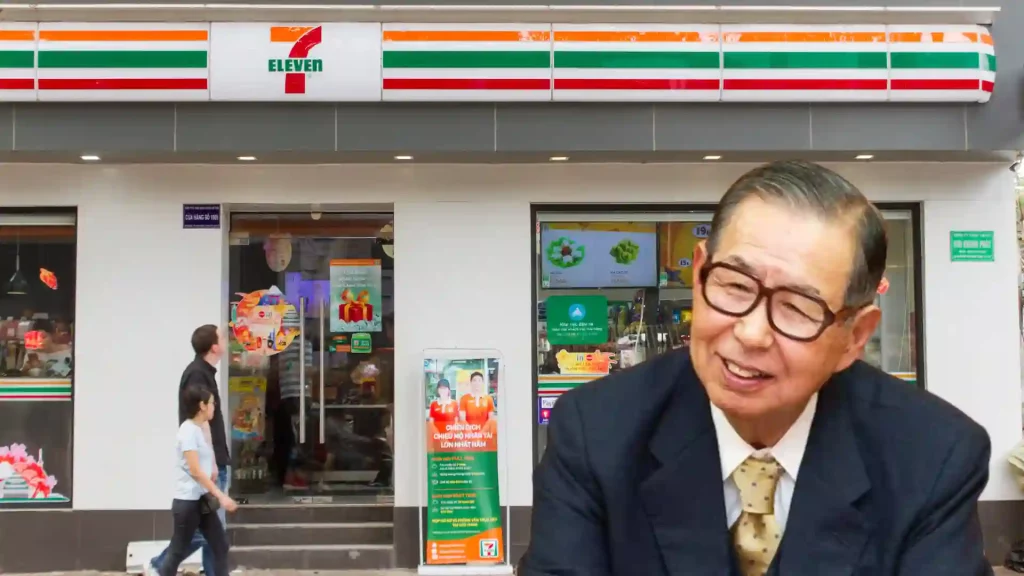7-Eleven is a convenience store chain that has become a household name in many countries in the world. From its humble beginnings as an ice house in Texas in 1927, it has grown into a global retail giant with more than 83,000 stores in 19 countries.
The founder of Ito-Yokado retail group, the holding company of 7-Eleven convenience stores, Masatoshi Ito passed away on 10 March 2023, at the age of 98, due to old age.
The Early Days of 7-Eleven
7- Eleven started as an ice house in 1927 when the Southland Ice company began selling ice blocks to households to keep their food fresh. However, with the advent of electric refrigerators, the demand for ice declined rapidly. In 1928, southland Ice company’s president, John Jefferson Green, decided to start selling milk, bread, and eggs in addition to ice to increase revenue.
Thus, the first convenience store was born, with extended hours of operation to cater to those who worked late shifts or had irregular schedules. The store was open from 7 am to 11 pm, hence the name 7-Eleven. The concept was a huge success, and by 1946, Southland had opened 100 stores.
Masatoshi Ito and 7-Eleven’s Expansion
In 1956. Masatoshi Ito took over a small apparel store, managed by his uncle and half-brother, in Tokyo. In the coming years, he expanded the store into one of the leading one-stop convenience store chains in the country.
In 1973, Ito bought a controlling stake in 7-Eleven. He saw the potential for 7-Eleven to expand beyond the United States and into other countries, particularly Japan. After Ito-Yokado finalized a deal with the Southland Corporation, the first 7-Eleven store in Japan opened in 1974.
Under Ito’s leadership, the retail chain grew rapidly. In 1984, it had 7,800 stores in 10 countries. By 1990, it had more than 13,000 stores in 15 countries. Ito’s strategy was to expand through franchising, allowing independent business owners to operate 7-Eleven stores in exchange for a fee and a share of the profits.
This strategy was successful because it allowed the chain to expand quickly without having to invest large amounts of capital in each new store. It also allowed local entrepreneurs to enter the retail market with the support of a well-established brand.
In addition to expanding globally, Ito also introduced new products and services to 7-Eleven stores. In 1974, he introduced self-service soda fountains, which allowed customers to dispense their own soft drinks. In 1977, he introduced the Slurpee, a frozen drink that became an instant hit with young people and is still quite popular.
Ito also introduced a computerized inventory system that allowed stores to track sales and inventory in real time. This system was groundbreaking at the time and allowed 7-Eleven to manage its stores more efficiently and reduce waste.
The Legacy of Masatoshi Ito
Masatoshi Ito was a visionary leader who noticed the potential for 7-Eleven to become a global giant, and he executed his vision by focusing on franchising which sky-rocketed the business quickly and efficiently. Along with this, the introduction of new products and services helped to make 7-Eleven a popular destination for customers.
Ito’s legacy expands beyond 7-Eleven. He was also known for his philanthropy, particularly in the areas of education and healthcare. He founded the Ito foundation, which provides grants for research and education in Japan. He also established the Ito Nursing School, which trains nurses to provide care to the elderly. Ito also donated millions of dollars to various charities and was a supporter of the arts.
In 1992, Ito retired as the chairman of the franchise, yet continued as the firm’s honorary chairman. Today, 7-Eleven continues to thrive as a global giant, with a presence in 19 countries and a very loyal customer base.
The Impact of 7-Eleven on the Retail Industry
7-Eleven has had a significant and lasting impact on the retail industry, particularly in the area of convenience stores. It was one of the first retailers to offer extended hours of operation, allowing customers to shop at their convenience. It was also one of the first to introduce self-service soda fountains and the Slurpee, which went on to become a staple in convenience stores.
The franchising model of 7-eleven has also been quite influential. It has inspired other retailers to adopt similar models, allowing them to expand quickly. Today, franchising is a popular business model in many industries, from fast food to home services.
Finally, 7-Eleven’s success has only reiterated the importance of adapting to change and always focusing on the needs of the consumer.
